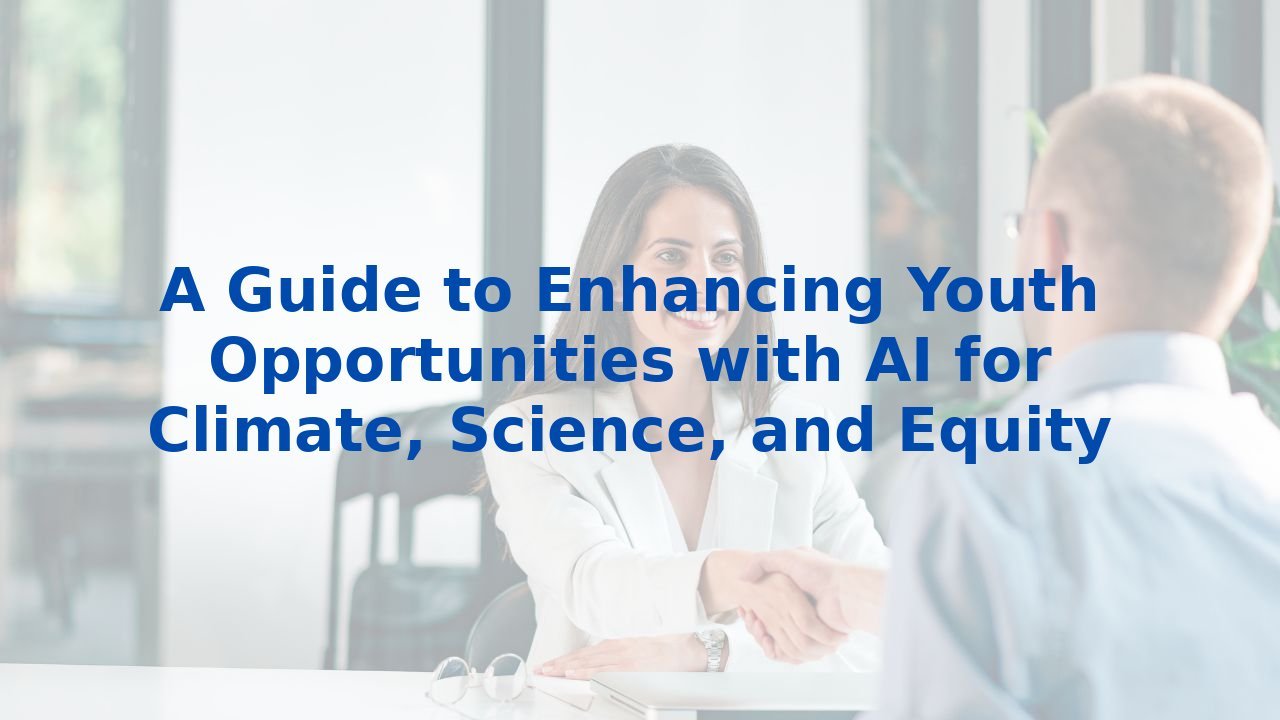A Guide to Enhancing Youth Opportunities with AI for Climate, Science, and Equity
A Guide to Enhancing Youth Opportunities with AI for Climate, Science, and Equity
Introduction
In the fast-paced, ever-evolving landscape of the digital age, technology serves as a cornerstone for creating opportunities, particularly for the youth. Artificial Intelligence (AI) stands out as a transformative force, making processes more efficient and insights more accessible. This guide delves into how AI can be a game-changer in the realms of climate, science, and equity, showcasing its benefits and potential for empowering the next generation.
Leveraging AI for Climate Initiatives
A key area where AI can make a significant impact is within climate-related initiatives. The vast amounts of data generated by environmental processes can be daunting; however, AI possesses the capability to transform this challenge into an opportunity.
- Data Analysis: AI algorithms excel at processing large datasets pertaining to climate change. By analyzing weather patterns, carbon emissions, and environmental metrics, AI can provide organizations with vital information that can inform better decision-making.
- Predictive Modeling: With AI modeling techniques, we can predict climate-related events. This foresight enables communities and organizations to develop strategies for early warning systems, thereby enhancing preparedness.
- Sustainability Solutions: AI can also identify sustainable practices. For example, it can evaluate energy consumption patterns and suggest energy-efficient practices or recommend renewable energy sources based on various factors.
AI in Science Education
The integration of AI into science education is redefining how knowledge is imparted and absorbed. This technology enables a more personalized learning experience, engaging students and fostering a deeper understanding of complex scientific concepts.
- Personalized Learning: AI-driven adaptive learning systems customize educational experiences to fit individual students’ needs, making education more effective.
- Virtual Labs: The advent of AI-powered virtual labs allows students to conduct experiments in a digital setting, providing access to scientific exploration without the limitations of physical resources.
- Research Assistance: AI simplifies the research process by analyzing existing literature, enabling students to identify trends and areas of interest that deserve exploration.
Empowering Youth through AI
To truly empower youth, we must provide not just access to AI tools, but also the necessary training and support needed to utilize these tools effectively.
- Training Programs: Comprehensive training initiatives can equip young individuals with a solid foundation in AI, its diverse applications, and the ethical considerations surrounding its use.
- Mentorship: Establishing mentorship programs can bridge the gap between theoretical knowledge and real-world application. Experienced professionals can offer invaluable guidance to young learners embarking on AI-related projects.
- Innovation Hubs: Innovation hubs serve as collaborative spaces where youth can experiment with AI-driven ideas, promoting creativity and fostering a culture of innovation.
Benefits of AI Training for Employees
Beyond empowering youth, organizations must focus on building an AI-savvy workforce. Training employees on AI applications can yield numerous benefits:
- Enhanced Efficiency: AI's capability to automate repetitive tasks allows employees to redirect their focus towards strategic initiatives, increasing overall productivity.
- Improved Decision-Making: Access to data-driven insights provided by AI can refine decision-making processes, enabling organizations to respond more adeptly to changing conditions.
- Innovation: When employees are trained to harness AI effectively, they are more likely to create innovative solutions. This drives organizational growth and strengthens competitiveness in an increasingly tech-focused world.
Conclusion
The potential of AI to transform youth opportunities in climate, science, and equity is promising. By enhancing data analysis, improving predictive accuracy, and enriching educational experiences, AI can empower the next generation to confront the multifaceted challenges of our time. Integrating AI into both educational and professional environments not only develops essential skills but also fosters a society equipped to navigate future complexities. To explore comprehensive AI training programs that can prepare your workforce, consider visiting resources that lay the groundwork for competency in this critical field. Together, we can cultivate a tomorrow where youth are not just participants, but pioneers of innovation.



